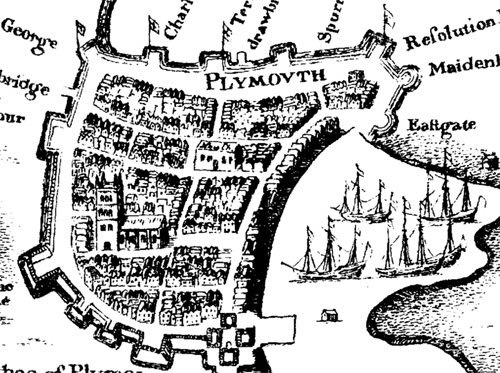Plymouth Branch Programme

website: www.ha-plymouth.org.uk
All enquiries to Alan H. Cousins, 1 Russell Court, Russell Close, Saltash PL12 4LZ Tel. 01752 843750 email a.cousins345@btinternet.com
Membership secretary: John Stead, 2 Jessops, Plympton, Plymouth, PL7 4HW
Meetings are open to all and are free for national or local members of the Historical Association, and for University of Plymouth students. Visitors £6, concessions £4.
Associate membership rates: Individual £8; Family £12; Student £4
Booking for lectures: The easiest approach is to book tickets through Eventbrite (see The Bridge link). Otherwise contact The Bridge, University of Plymouth thebridge@plymouth.ac.uk or phone The Bridge on 01752 585050
Apart from the talk on June 9th, talks are held in the Lecture Theatre, Roland Levinsky Building, University of Plymouth, Drake Circus, Plymouth PL4 8AA. Circumstances may mean that one or more of the talks in the series will need to be streamed online.
This is a joint programme in collaboration with the History Department at Plymouth University.
Plymouth Branch Programme 2025 - 2026
7 October 2025
Joseph Stalin, film star: the cult of personality on Soviet screens
Dr Claire Knight, University of Bristol
In the Soviet Union, cinema was a tool of the state. Or at least it was meant to be. Stalin took to heart Lenin’s assertion that “of all the arts, cinema is the most important for us,” and presided over the most intensive era of film censorship to that point in history. He also appeared on screen—not personally, but as a character in contemporary feature films, making him the first political leader to do so. Who exactly was this cinematic Stalin? And was he a success for a regime set on shaping audiences through film? This talk explores these questions and the audacious oddity that was Joseph Stalin, film star.
14 October 2025
The Liberation Line: Re-establishing European Railways after D-Day
Christian Wolmar, author & visiting Research Fellow University of Plymouth
The Liberation Line tells the story of the British and American railway engineers who, in the months after D-Day, worked around the clock and in great danger to rebuild the ravaged railways of Europe and keep the Allied forces fuelled as they pushed on into Germany. As territory was taken, these soldier-railroaders were close behind, rebuilding the lines, putting up telegraph wires, replacing bridges and laying track, all the while dodging bullets, shells and booby traps. Tales of extraordinary feats and heroism abound, including how 10,000 men rebuilt a 135-mile-long railway in just three days; the reconstruction of the bridge over the Seine in two weeks while under bombardment; and the use of cigarette lighters as improvised signalling systems.
20 January 2026
Prince Maurice’s Invasion of Devon 1643
Philip Photiou (author)
The talk covers the royalist invasion of Devon in 1643, when Prince Maurice’s army invaded Exeter, Dartmouth, and towns in North Devon, and the ensuing siege of Plymouth in the winter of that year. Cannon positions at Mount Stamford were unsuccessful in stopping ships entering Plymouth Sound. Various attacks by the Royalist troops were repulsed and the siege was lifted by the end of the year.
3 February 2026
Revisiting the General Strike
Professor James Thompson, University of Bristol
The 1926 General Strike was a major event in British society during the 1920s. Economic times were tough in Britain after the First World War and there was a growing fear of Communism. The strike originated as an industrial dispute between the miners and the mine owners, over reduced pay for more hours work. When the Trades Union Congress (TUC) declared their support for the strike, other industrial workers walked out and it became the first ever General Strike for Britain. The strikers wanted to force the government to intervene and stop the mine owners from increasing their daily hours from 7 to 8 hours whilst reducing wages by 13%.
24 March 2026
The Durston Lecture
Details TBC
5 May 2026
Spies and British Prime Ministers
Professor Richard Aldrich University of Warwick
In the early part of the 20th century prime ministers were often naively indifferent to espionage and secret intelligence. Increasingly the relationships between intelligence agencies and Number 10 became very close, especially from the time of the Second World War. The increasing power of PMs since the war went hand in hand with the growth of the secret service. However, Intelligence also imperilled more than one British prime minister.
9 June 2026 **Venue to be announced**
Lessons to be learned from the history of the golly, 1895-2026
Dr Todd Gray, historian & Research Fellow at University of Exeter
Todd Gray discusses the sensitive topic of the black fictional toy character which has become a symbol of racism. Todd claims that race was not considered the defining feature of the original golliwog dolls which were created in 1895. His research shows the golliwog’s roles were not only as a childhood doll but as a mascot, corporate trademark, charity fundraiser, entertainment figure and Great War amulet. He reveals the reasons behind how, as Britain’s most prevalent image of a Black man, it developed simultaneously as a cherished childhood toy and racist icon in his new book Waterwogs and the Contested History of the Golliwog.

